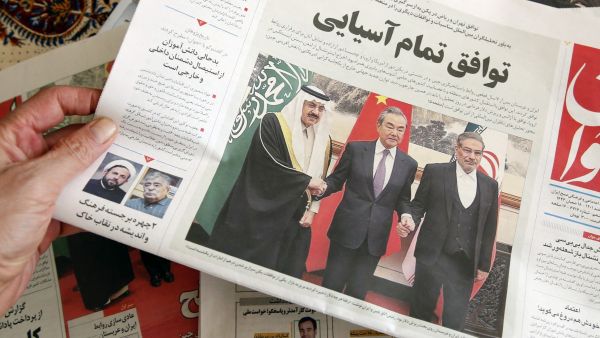ALBAWABA - A China-brokered deal that has longtime regional rivals Saudi Arabia and Iran ending years of estrangement dealt a blow to Israeli Prime Minister Benjamin Netanyahu, whose top priority is to confront Tehran's threat in the region, and sidelines the United States, the only global superpower that traditionally engages in the Mideast's political intricacies.
The breakthrough announced in Beijing on Friday is a culmination of more than a year of negotiations in Iraq, and more recently closed-door discussions in China. The foreign ministers of both countries are expected to meet in the next few days to hammer out the details.
Under the agreement, Iran and Saudi Arabia will "patch up their seven-year split by reviving a security cooperation pact, reopening embassies in each other’s countries within two months, and resuming trade, investment and cultural accords," the New York Times reported.
Iran and Saudi Arabia agree to re-open embassies in China brokered diplomatic deal https://t.co/BjfNaIyK2S pic.twitter.com/TMMaezRcYx
— New York Post (@nypost) March 11, 2023
The deal comes at a time when tensions run high between the United States and its traditional Saudi ally over Washington's eroding security guarantees over Iran's threat to Riyadh and other Gulf Arabs, and Saudi Arabia’s decision to cut oil production to keep crude prices high during Russia’s war in Ukraine.
The United States welcomed the deal. John Kirby, National Security Council coordinator for strategic communications, said in a briefing to reporters Friday: "If this deal can be sustained — regardless of what the interest was or who sat down at the table — if it can be sustained, and the war in Yemen can end, and Saudi Arabia doesn't have to continually try to defend itself against attacks from the Houthis who are funded and supported by Iran, in the end we welcome that," according to Voice of America.
For Iran, it's an opportunity to end its international isolation and the international sanctions that have crippled its economy as the global community puts pressure on its regime to cooperate on its nuclear program, a thorn in the side of Israel, the United States and Sunni governments across the Mideast.
Netanyahu, the hardline Israeli premier who took office in late December, pledged in his election campaign last year to curb Iran's influence in the region.
In an article entitled "Israel's dangerous shadow war with Iran," Foreign Affairs said "in the last few months... Israel’s appetite for risk seems to have increased." It pointed to purported Israeli attacks on Iran, such as one in early January, when an "Israeli strike on pro-Iranian militant groups inside Syria put the international airport in Damascus out of service."
It said that later in January, reports "indicated that Israel had carried out a significant drone attack on a military site in the Iranian city of Isfahan. And last month, a considerable Israeli strike reportedly targeted Iranian officials meeting in a residential neighborhood in Damascus."
Riyadh's deal with Tehran could complicate Netanyahu's effort to normalize Israel's relations with Arab powerhouse Saudi Arabia. The Netanyahu government and U.S. President Joe Biden’s administration have been trying to expand the 2020 Abraham Accords to include Saudi Arabia, which has been holding out, making demands both on Israel and the United States.
Iran International quoted a senior Israeli official as saying the Saudi decision to re-establish diplomatic ties with Iran, severed since 2016, "will not have an impact on the chances of Israeli-Saudi relations."
The official, accompanying Netanyahu during his trip to Italy on Saturday and speaking on condition of anonymity, said that the Israeli government knew about the talks between Tehran and Riyadh “for a long time” and was following the process, according to Iran International.
But Netanyahu's predecessor, Naftali Bennett, differed. He described the Saudi deal with Iran as harmful to chances of bringing Saudi Arabia into the Abraham Accords, pointing out that it is a serious defeat for the serving Israeli premier, Israeli media reported.
Aside from regional considerations, the deal signaled a changing global order, according to analysts. "It underlines the fact that the United States is no longer the only power with a final say in the region," said Riad Qaisi, a Jordanian political science professor.
Nevertheless, it is "ironic that while the United States was encouraging Saudi Arabia and the other Sunni Muslim governments to go to war with the rival Shiite Muslim Iran to curtail its growing influence in the region, China brokered peace," he told Albawaba _ a sentiment voiced by many on social media platforms.
This is a big deal: China helped broker peace between Saudi Arabia and Iran
— Ben Norton (@BenjaminNorton) March 11, 2023
The US pressured Saudi Arabia to attack Iran and its allies, using Salafi-jihadist fascists as proxies
China encouraged peace
Iran is joining the BRICS. Saudi expressed interesthttps://t.co/4QR2PI20hd
The Wall Street Journal (WSJ) said the restoration of diplomatic relations between Tehran and Riyadh "reflects the new reality: With Washington increasingly preoccupied in Ukraine and Asia, the region is trying to move past its old divisions, resolving conflicts and easing tensions."
"As part of the deal, Iran pledged to halt attacks against Saudi Arabia, including from Houthi rebels it backs in the Yemen civil war," WSJ said, quoting unnamed Saudi, Iranian and U.S. officials.
ICYMI: As part of the Chinese-brokered deal with Saudi Arabia, Iran's regime has pledged to halt attacks against its Arab archrival, including from Houthi rebels it backs in the Yemen civil war, Saudi, Iranian and US officials told @WSJ. pic.twitter.com/bxTFmS5DOF
— Iran International English (@IranIntl_En) March 11, 2023







